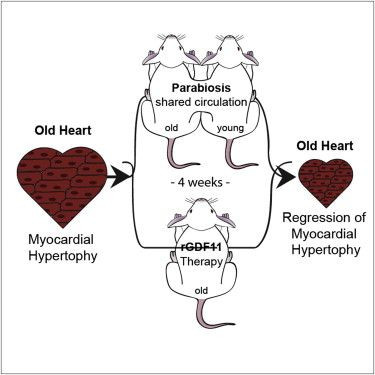Blood 'Youth' Hormone Reverses Heart Failure in Aging Mice

In a new study, old mice injected with young blood experienced a rejuvenation of their aged heart tissue. The research pinpoints a youth-promoting hormone that could reverse symptoms of heart failure in humans as well.
Cardiac muscles often thicken with age, a process called myocardial hypertrophy that constricts the chambers of the heart and makes it more difficult to pump enough blood to circulate throughout the body.
This can result in heart failure, which causes debilitating symptoms like shortness of breath, fatigue, and swelling throughout the body.
Heart failure is becoming increasingly common as the American population ages, which is worrisome because there is still no cure. According to the National Institutes of Health (NIH), about 5.8 million people in the United States currently have the condition.
The new research, published today in the journal Cell, suggests a possible method of treating and reversing progressive heart failure in people with thickened cardiac muscles.
"There has been evidence that circulating bloodstream factors exist in mammals that can rejuvenate tissues, but they haven't been identified. This study found the first factor like this," said senior author Richard Lee of the Harvard Stem Cell Institute in a news release.
That factor is a blood hormone called growth differentiation factor 11 (GDF11), which the researchers found declines as mice age.
In order to discover the role of that hormone, Lee and his colleague Amy Wagers led a research team in an experiment that may seem bizarre to the uninitiated: they surgically joined together the circulatory systems of pairs of mice so their blood flowed into each other's bodies.
That technique is called heterochronic parabiosis, a method of discerning what circulating blood factors are responsible for causing physical changes in the body. By joining two mice that differ dramatically in one key trait, like an obese mouse and a healthy one, scientists can see whether and how each physically changes when exposed to the other's blood.
In each pair, one mouse was a young and healthy 2-month old, while the other was a wizened 23-month old with thickened heart muscles.
The mice were left conjoined for four weeks before their heart muscles were analyzed, at which point the researchers discovered that the thickening of heart tissues in the older mice was dramatically reversed.
"The hearts had shrunk as far as they were going to go," Wagers told the New Scientist. "It was quite striking how the heart responded... they were pretty much the same as in the young partner."
Blood screening revealed that GDF11 levels were initially much lower in older mice. The researchers suspected that treatment with the hormone might reverse thickened heart tissue in old mice, even without sewing them to younger ones.
In a second experiment, researchers confirmed the role of GDF11 by injecting older mice with the hormone. 23-month old mice received injections of either GDF11 or saline solution every day for one month, and as expected, the ones who received the hormone treatment had significantly smaller and healthier hearts.
GDF-11 is apparently present in human blood, though it's unclear whether it works in quite the same way. Future research will determine whether restoring the hormone in older people with thickened cardiac muscles can reverse their symptoms of heart failure.
"It's conceivable that this is just an interesting mouse story," Lee told Science Now, "but we're hoping to get data that might tell us that it pertains to humans."
Published by Medicaldaily.com



























